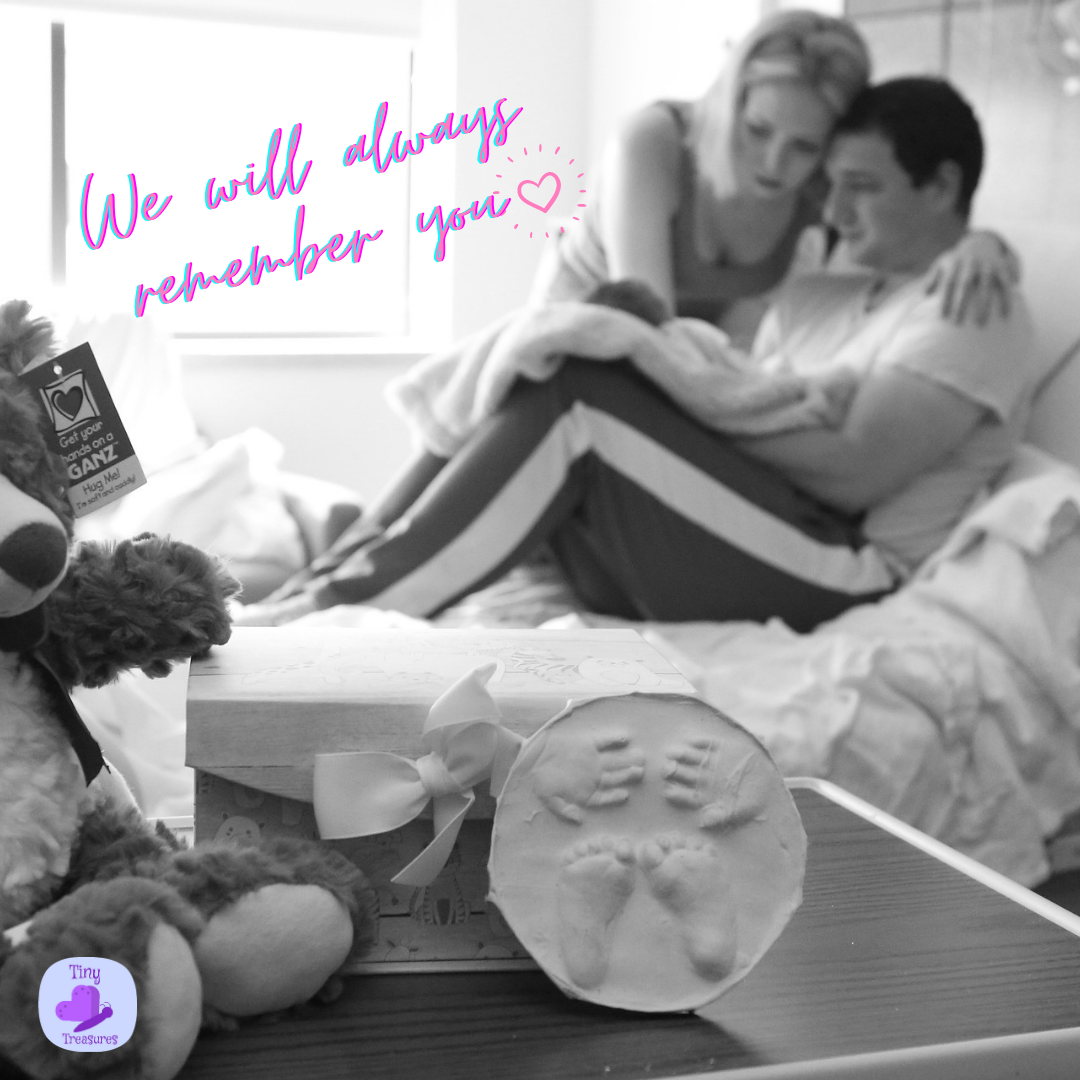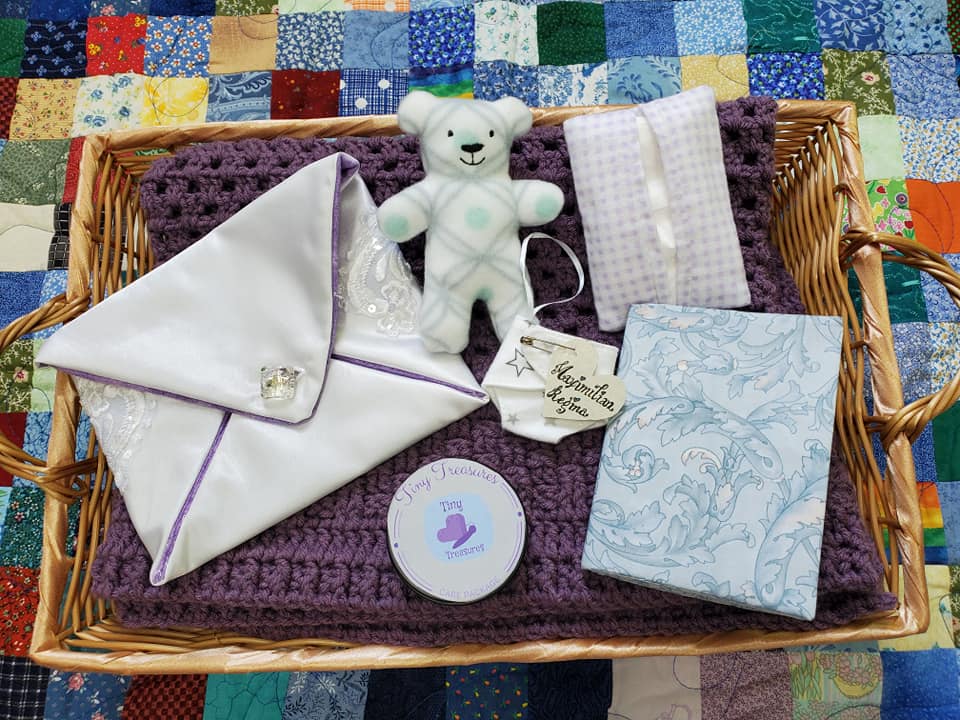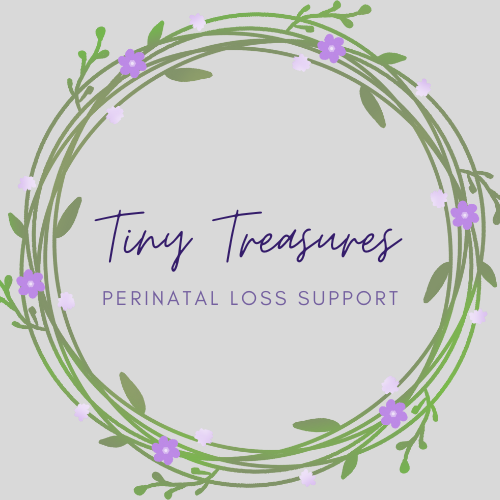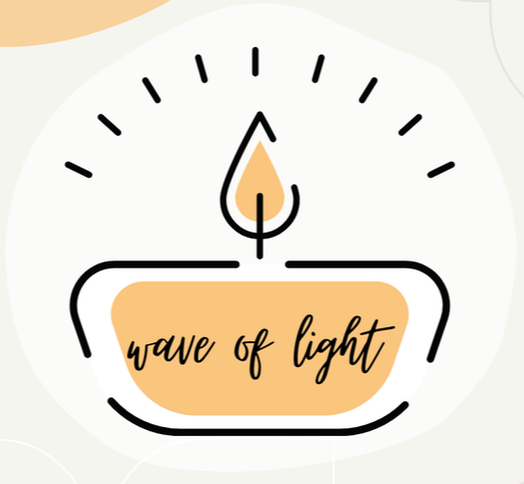First, a little of my own story. As newlyweds who weren't trying to conceive, my husband and I weren't expecting to become pregnant only six months into our marriage, but I was thrilled. I recall announcing my pregnancy to my employer and being scolded for breaking the unspoken rule (of which I was unaware!) that you shouldn't tell people you're pregnant until you have passed the somehow magical twelve-week point of pregnancy. (The truth is pregnancies do end after twelve weeks -- and unannounced earlier losses aren't necessarily any easier to live through...alone.) Just a few weeks after my pregnancy announcement, I noticed I was bleeding. Immediately seeking medical care, I was devastated when I was informed that the embryo had not formed after implantation. Sadly, our tiny first baby had died very early in development. We were the first of our friends to get married and certainly the first to lose a baby, and I felt quite alone during that loss. Thankfully, I received support from our midwife and a local organization that still supports families going through pregnancy loss. When someone you know has announced their pregnancy, only to find out at some future time that their baby's life (or babies' lives) have ended before or during birth, it can be a confusing situation for loved ones. You might wonder what to say or do, and what not to say and do. Every bereaved parent grieves differently and has different needs, so the best practice is simply to ask, "What can I do for you?" However, in the midst of the fog and pain of grief, it can be difficult for bereaved parents to come up with any concrete answers to this question, so here are some general principles that are a good place to start. You can remember these tips with the acronym: SUPPORT. SPIRITUAL SUPPORT. Parents who have lost a child or baby have a real need for their spiritual community to encircle them with heartfelt prayers of blessing, sorrow, and hope; practical service; reflective listening; and genuine caring. As I was before my first pregnancy, many new parents may be blissfully unaware that pregnancies don't always result in gender reveal parties, glamorous baby bump photos, and picture-perfect nurseries, but instead end in physical pain, uncomfortable procedures, and a grave. Such a shock can be a significant challenge to their faith. Are they being punished for something they did in the past? How could a loving God allow them to live through such pain? Does God even care about what they are going through? The bereaved family has a right to experience their spiritual community (or even a loving friend of faith, if the family is not a member of a faith community) to accompany them through their grief. To assure them they are not being punished for past sins or mistakes. That God is with them in their grief. That He weeps with them. And please, unless you are truly a prophet with some extraordinary revelation, do not make the mistake of falsely promising that God will give them a baby in the future. Such false promises only ease your own discomfort at walking with this family's grief and can be a future source of pain and even loss of faith if the "prophecy" fails to come true. USE THE BABY'S NAME. While not all bereaved parents may choose a name for the baby who has passed away, it can be healing to do so. If they do choose a name, it is healing to their hearts to hear you use the baby's name. For example, "Can I see Talia's ultrasound photos?" or "Where is Easton's grave? I'd like to visit." Losing a baby is a unique pain because there may be very few or even no physical reminders of his or her existence once the loss is complete. There may be no birth certificate, no gravesite if the loss was early, no birth photos, perhaps not even any clothes or diapers left behind. Using the child's name assures the parents that their child did exist, although his or her life was brief. Using the baby's name is a way to demonstrate that you are bearing the burden of grief with the parent; he or she doesn't have to be the only person to bear witness to the unique value of the child's life. And if the parents do not choose a name, I suggest you refer to their child as "your baby" rather than clinical or dehumanizing terms such as "the fetus," "the product of conception," "the embryo," or "it." PHYSICAL SUPPORT. In the early days, weeks, or months, the trauma of loss may be very intense. Help the family with physical needs such as providing water bottles, food and meals, gift cards for food (or gas cards if the mother is hospitalized for an extended time), doing laundry, or cleaning house. However, do not try to be "helpful" by cleaning out the baby's nursery or putting away the baby's things, unless specifically asked to do so by the parents. While it will likely be painful for them to see the nursery or baby's clothes, toys, or other gear, it can be an important part of the healing process to live with these things for awhile as it helps assure them that the baby did live for a short while, even though he or she is no longer alive. When they are emotionally ready, it can be an important step in the parents' healing to personally be the ones to decide to put baby's items away or let them go. Don't try to hurry this step along without being asked by them, and thus rob them of what could be important steps in their healing journey. PATIENCE AND LISTENING. Be sensitive that grief for a baby may last a long time, longer than you expect. Avoid platitudes or cliches such as "you can have another;" "time heals all wounds;" or false beliefs such as "God took the baby because He needed another angel." Instead, listen, hand out tissues to catch tears, and offer a hug. Affirm the parents' feelings. "You sound really mad; that would make me mad, too." "You really needed someone to be there for you; I'm sorry I couldn't be there. I'm here now." "It sounds like you really miss not only the baby, but all the things you wanted to do with him / her." "You sound like you feel guilty about ..." Do your best to not judge the parents' feelings. Encourage them to get help from a trained mental health professional or spiritual counselor if they begin to seem overwhelmed by their grief. Offer to drive them to appointments as it can be difficult to do things like driving or finding new places when you are in the midst of deep grief and possibly a mental health crisis. ORGANIZE HELP. In coordination with your faith community, school community, neighborhood, workplace, or social club, organize help for the family with things like childcare for any older children, meals / meal trains and household help. If organizing things is not your strength, recruit someone who is good at it! Little by little, with healing and good support, the family will be able to resume these activities, but in the meantime, you can make a huge difference for this family.
TALK ABOUT THE BABY. A common myth is that you shouldn't talk about the baby because it will remind the parents about their child and make them sad. Trust me; they won't forget their child. Early in the grieving process, the bereaved parent will frequently be consumed by thoughts of their baby and the loss. As the grief journey matures, thoughts of the child will gradually become less frequent, but hearing that you still remember him or her will likely be very comforting to them. Bereaved parents need to know that their baby's life mattered and that they do not hold the sole burden of remembering this tiny, and very important, life. It has been many years since my first loss, and since then, I have had the blessing of seven living children, and the sorrow of several other losses. Thankfully, compared to my first loss of Kate Leilani in 1998, I experienced so much more awareness and support by my friends and community when I suffered the loss of my baby, Anais Zelie, in 2016. Hopefully, this list of practical ways to SUPPORT your loved one will help you so you can accompany your loved one through the loss of their precious baby. Comment below and let me know if this list was helpful to you! What would you add? RESOURCES FOR FAMILIES EXPERIENCING PREGNANCY OR INFANT LOSS
Halos of the St. Croix Valley. For St. Croix Valley residents in Minnesota and Wisconsin, and Twin Cities area residents, Halos provides emotional and financial support for families experiencing the loss of a child at any point from pregnancy through age 20. Catholic Miscarriage Support. A website with practical resources for Catholics about miscarriage and links to sources of support, for miscarriage and stillbirth, throughout the USA.
0 Comments
|
Details
Archives
November 2023
Categories
All
Enter Your Email Address to get St. Croix Birth Blog Posts in Your Inbox(We don't collect your email address and you won't get anything else from us.)
|






 RSS Feed
RSS Feed